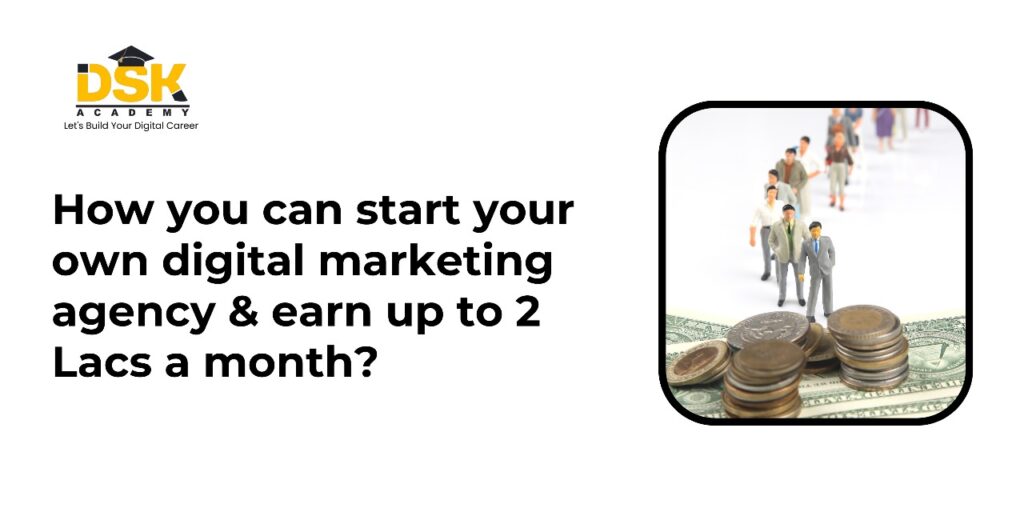How you can start your own digital marketing agency & earn up to 2 Lacs a month?
Introduction In an era driven by digital advancements, businesses are constantly seeking innovative ways to reach their target audience, establish a strong online presence, and boost their profitability. The growing demand for digital marketing services has paved the way for entrepreneurs to start their own digital marketing agencies, which, with dedication and the right strategies, have the potential to generate earnings of up to 2 Lacs a month. In this comprehensive guide, we will delve into the essential steps required to launch your own digital marketing agency successfully, all while highlighting the significance of digital marketing courses in Mumbai with placement opportunities. Understanding the Digital Marketing Landscape The foundation of starting a digital marketing agency lies in having a profound understanding of the digital marketing landscape. Digital marketing encompasses a broad range of strategies and channels, including: 1. Search Engine Optimization (SEO): The art of optimizing websites to rank higher on search engine results pages. 2. Content Marketing: Crafting valuable and engaging content to captivate and maintain your target audience. 3. Social Media Marketing: Making use of platforms such as Facebook, Instagram, Twitter, and LinkedIn to bolster brand awareness and engage with customers. 4. Email Marketing: Employing email campaigns as a means to establish connections with potential and existing customers. 5. Pay-Per-Click (PPC) Advertising: Managing online advertisements to drive traffic to websites and generate leads. 6. Analytics and Data Analysis: Utilizing data to measure and evaluate campaign performance, which in turn informs strategies for optimization. Before embarking on your journey, it’s vital to become well-versed in each of these aspects, as you may choose to offer services in one or more of these areas. Identifying Your Niche In an ever-competitive digital marketing landscape, finding your niche is a critical move. Identifying a specific industry or type of business to focus on allows you to specialize and stand out in a crowded market. Your niche could be anything from e-commerce and healthcare to real estate or even a specific marketing channel, such as Facebook advertising. Discovering your niche enables you to become an expert in that field, making it easier to comprehend the unique challenges and opportunities within that industry. This expertise will help you offer tailored solutions, attract clients seeking specialized services, and differentiate your agency from the competition. Building Your Digital Marketing Skillset To run a successful digital marketing agency, it’s imperative to possess a comprehensive skillset. This includes: 1. Content Creation: The ability to produce high-quality written and visual content. 2. SEO Expertise: A deep understanding of the principles of SEO and how to optimize websites for search engines. 3. Social Media Management: Proficiency in creating and managing content across various social media platforms. 4. Advertising Knowledge: Familiarity with the ins and outs of running effective ad campaigns on platforms like Google Ads and Facebook Ads. 5. Analytics and Reporting: The capability to analyze data and provide clients with valuable insights. Invest time in learning and mastering these skills through online courses, certifications, and hands-on experience. Continuous learning is imperative in the rapidly evolving world of digital marketing. Creating a Business Plan A well-structured business plan is the bedrock of any successful business venture. Your business plan should encompass: 1. Mission and Vision: Defining your agency’s purpose and long-term goals. 2. Services Offered: Detailing the digital marketing services you will provide. 3. Target Audience: Identifying your ideal clients and the industries you will serve. 4. Pricing Structure: Determining your pricing strategy, whether it’s hourly rates, project-based fees, or retainer contracts. 5. Marketing Strategy: Describing how you will promote your agency and attract clients. 6. Financial Projections: Creating a financial forecast that outlines your expected income and expenses. An all-encompassing business plan not only guides your agency’s growth but also serves as a valuable tool for attracting potential investors or partners. Legal Formalities and Registration Operating a legitimate business necessitates compliance with local laws and regulations. Depending on your location, you may need to register your business, obtain necessary licenses, and adhere to tax regulations. Consulting with a legal expert or accountant can ensure that you are in full compliance with all legal requirements. Setting Up Your Office Decide whether you want to operate your agency from a physical location or work remotely. In the digital age, many agencies successfully function entirely online. If you opt for a physical office, consider factors such as location, rent, and the equipment needed to run your operations smoothly. Creating Your Brand Identity Your agency’s brand identity plays a pivotal role in establishing credibility and attracting clients. Develop a professional logo, choose a memorable company name, and design a website that showcases your services and portfolio. A well-designed website serves as the face of your agency and a platform for client acquisition. Building a Portfolio Clients want to see tangible evidence of your work and its impact. A portfolio that showcases your best projects and case studies is a powerful tool to demonstrate your expertise and track record to potential clients. It provides insight into the quality of your work and your ability to deliver results. Developing a Sales and Marketing Strategy To generate leads and acquire clients, you need a solid marketing and sales strategy. Consider the following methods: 1. Content Marketing: Create blog posts, videos, and infographics that showcase your expertise and provide value to your target audience. 2. Networking: Attend industry events, join professional organizations, and build relationships with potential clients. 3. Social Media: Utilize platforms like LinkedIn and Twitter to connect with potential clients, share your knowledge, and engage with your audience. 4. Cold Emailing and Calling: Reach out to potential clients with personalized pitches and offers. 5. Referral Programs: Encourage satisfied clients to refer others to your agency, creating a network of valuable connections. Pricing and Contracts Determining your pricing structure is a crucial step. Base your pricing on factors such as your costs, competitive rates, and the value you provide. Consider offering flexible packages, including monthly retainers, project-based fees, or hourly rates. Moreover, draft clear and
How you can start your own digital marketing agency & earn up to 2 Lacs a month? Read More »

